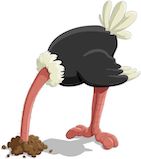 Denial is not a river in Egypt but you can drown in it Being in denial is a natural part of the grieving process, but the longer we stay in denial the more likely it will lead to self-sabotaging behavior. While in denial mode we hide our feelings, are unwilling to acknowledge the bad things happening in our life, and downplay the possible consequences of our circumstances. A classic example is an active alcoholic who denies having a drinking problem, noting how well they function in their job and relationships. A topical example might be those who are in denial about the coronavirus oddly declaring, my body my choice as they gather together in a crowd. Acharei Mot, the first of this week’s double Torah portion Acharei Mot/Kedoshim, describes the ritual of the Azazel goat. The ritual involves two goats. One is offered as a sacrifice on the altar while the other, the Azazel goat has the collective sins of the community placed on its head. It is then let go out into the wilderness along with the sins of the community, a process that has become known as scapegoating. Through this process the Azazel goat becomes the “scapegoat” for the people’s sins. Today the term scapegoat has a much more negative connotation, meaning someone or something blamed for all that goes wrong. We blame someone else and are then able to relinquish our own responsibility for our problems. Some typical scapegoats might be our families, our jobs, or the things that are missing in our lives. Denial may be a natural part of the healing process but If we wait too long to overcome it, we will find that denial may not be a river in Egypt but you can drown in it. Shabbat Shalom, Ellie Comments are closed.
|
Archives
May 2024
|
OFFICE Hours
|
Telephone802-773-3455
|
Email ADDRESS |

 RSS Feed
RSS Feed